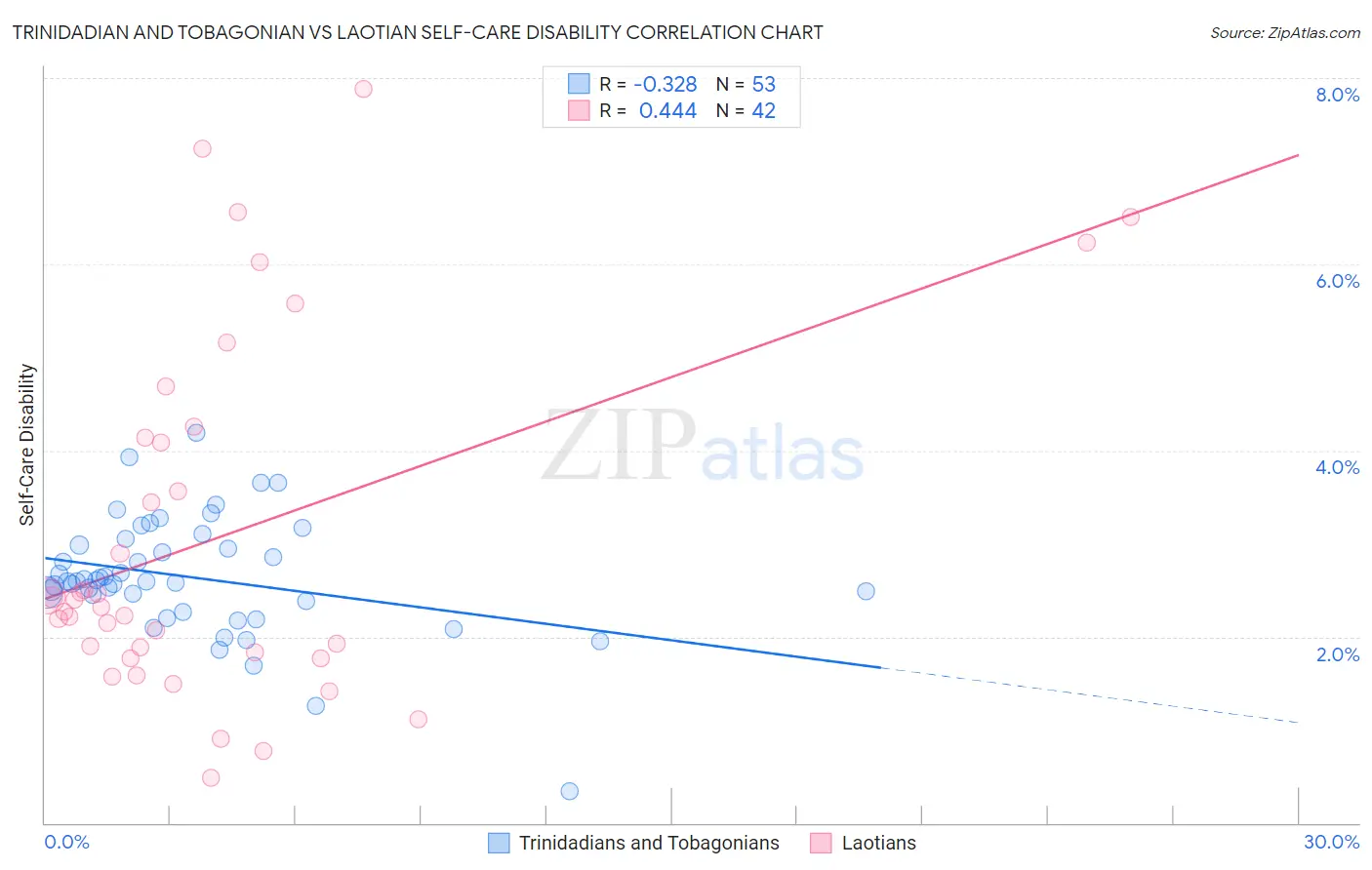Trinidadian and Tobagonian vs Laotian Self-Care Disability
COMPARE
Trinidadian and Tobagonian
Laotian
Self-Care Disability
Self-Care Disability Comparison
Trinidadians and Tobagonians
Laotians
2.7%
SELF-CARE DISABILITY
0.1/ 100
METRIC RATING
271st/ 347
METRIC RANK
2.4%
SELF-CARE DISABILITY
87.8/ 100
METRIC RATING
135th/ 347
METRIC RANK
Trinidadian and Tobagonian vs Laotian Self-Care Disability Correlation Chart
The statistical analysis conducted on geographies consisting of 219,630,331 people shows a mild negative correlation between the proportion of Trinidadians and Tobagonians and percentage of population with self-care disability in the United States with a correlation coefficient (R) of -0.328 and weighted average of 2.7%. Similarly, the statistical analysis conducted on geographies consisting of 224,705,626 people shows a moderate positive correlation between the proportion of Laotians and percentage of population with self-care disability in the United States with a correlation coefficient (R) of 0.444 and weighted average of 2.4%, a difference of 10.9%.

Self-Care Disability Correlation Summary
| Measurement | Trinidadian and Tobagonian | Laotian |
| Minimum | 0.34% | 0.49% |
| Maximum | 4.2% | 7.9% |
| Range | 3.9% | 7.4% |
| Mean | 2.6% | 3.1% |
| Median | 2.6% | 2.4% |
| Interquartile 25% (IQ1) | 2.3% | 1.8% |
| Interquartile 75% (IQ3) | 3.0% | 4.1% |
| Interquartile Range (IQR) | 0.69% | 2.3% |
| Standard Deviation (Sample) | 0.64% | 1.9% |
| Standard Deviation (Population) | 0.64% | 1.9% |
Similar Demographics by Self-Care Disability
Demographics Similar to Trinidadians and Tobagonians by Self-Care Disability
In terms of self-care disability, the demographic groups most similar to Trinidadians and Tobagonians are Immigrants from Laos (2.7%, a difference of 0.040%), Immigrants from Micronesia (2.7%, a difference of 0.060%), U.S. Virgin Islander (2.7%, a difference of 0.10%), Mexican (2.7%, a difference of 0.18%), and Yakama (2.7%, a difference of 0.24%).
| Demographics | Rating | Rank | Self-Care Disability |
| Immigrants | Iran | 0.2 /100 | #264 | Tragic 2.7% |
| Immigrants | Nicaragua | 0.2 /100 | #265 | Tragic 2.7% |
| Immigrants | Cambodia | 0.1 /100 | #266 | Tragic 2.7% |
| Yaqui | 0.1 /100 | #267 | Tragic 2.7% |
| Immigrants | Mexico | 0.1 /100 | #268 | Tragic 2.7% |
| U.S. Virgin Islanders | 0.1 /100 | #269 | Tragic 2.7% |
| Immigrants | Micronesia | 0.1 /100 | #270 | Tragic 2.7% |
| Trinidadians and Tobagonians | 0.1 /100 | #271 | Tragic 2.7% |
| Immigrants | Laos | 0.1 /100 | #272 | Tragic 2.7% |
| Mexicans | 0.1 /100 | #273 | Tragic 2.7% |
| Yakama | 0.1 /100 | #274 | Tragic 2.7% |
| Immigrants | Trinidad and Tobago | 0.1 /100 | #275 | Tragic 2.7% |
| Japanese | 0.1 /100 | #276 | Tragic 2.7% |
| Immigrants | Ukraine | 0.1 /100 | #277 | Tragic 2.7% |
| Ottawa | 0.1 /100 | #278 | Tragic 2.7% |
Demographics Similar to Laotians by Self-Care Disability
In terms of self-care disability, the demographic groups most similar to Laotians are Russian (2.4%, a difference of 0.050%), South American Indian (2.4%, a difference of 0.070%), Austrian (2.4%, a difference of 0.080%), Immigrants from Colombia (2.4%, a difference of 0.090%), and Immigrants from South America (2.4%, a difference of 0.12%).
| Demographics | Rating | Rank | Self-Care Disability |
| Immigrants | Hungary | 89.6 /100 | #128 | Excellent 2.4% |
| Immigrants | Romania | 89.3 /100 | #129 | Excellent 2.4% |
| Immigrants | Austria | 89.0 /100 | #130 | Excellent 2.4% |
| Poles | 88.9 /100 | #131 | Excellent 2.4% |
| Immigrants | South America | 88.8 /100 | #132 | Excellent 2.4% |
| Immigrants | Colombia | 88.5 /100 | #133 | Excellent 2.4% |
| Russians | 88.2 /100 | #134 | Excellent 2.4% |
| Laotians | 87.8 /100 | #135 | Excellent 2.4% |
| South American Indians | 87.2 /100 | #136 | Excellent 2.4% |
| Austrians | 87.0 /100 | #137 | Excellent 2.4% |
| Immigrants | Croatia | 86.6 /100 | #138 | Excellent 2.4% |
| Sri Lankans | 86.6 /100 | #139 | Excellent 2.4% |
| Immigrants | Uruguay | 85.4 /100 | #140 | Excellent 2.4% |
| Alaska Natives | 84.5 /100 | #141 | Excellent 2.4% |
| Immigrants | Peru | 83.2 /100 | #142 | Excellent 2.4% |